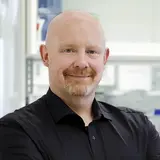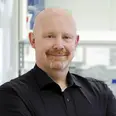Experimental Hematology
- Cell and Tumor Biology

Dr. Michael Milsom
Division Head
Advancing age is amongst the highest risk factors for development of most major cancer entities and also strongly correlates with poor response to therapy. The Division of Experimental Hematology uses the hematopoietic system as an experimentally tractable model tissue to investigate the fundamental biological principles underlying the process of aging, including age-associated malignant transformation.

Our Research
Our work encompasses the study of molecular events that mediate cellular aging; the environmental factors that impact upon the aging process; and the interplay between hematopoietic and non-hematopoietic cells that lead to age-associated diseases of the blood system and other organs. In addition to furthering our understanding of this complex multi-factorial process, our goal is to identify potential new strategies to delay, prevent or treat some of the clinically relevant features of aging.
Typical features of aged hematopoiesis that are of relevance to age-associated disease include increased likelihood of developing hematologic malignancies, anemia, dysregulated immune function (both immune suppression and pro-inflammatory hyperactivation), elevated platelet activation, decreased reserves of functional hematopoietic stem cells (HSCs), and a progression towards the development of “clonal hematopoiesis”. Our work focusses on gaining insight into the genetic, environmental and stochastic processes that drive the age-related evolution of these clinically-relevant processes in some individuals. To these ends, our research can be broadly divided into three research topics, which generally investigate the role that HSC exhaustion plays in mediating hematopoietic aging:
- Epigenome Remodelling
- DNA Damage and Mutagenesis
- Environmental Impact on HSC Aging
Dr. Milsom is also a group leader at the Heidelberg Institute for Stem Cell Technology and Experimental Medicine (HI-STEM), a public-private partnership between the DKFZ and the Dietmar Hopp Foundation. Further detail can be found on the website of HI-STEM.
Team
-

Dr. Michael Milsom
Division Head
-

Sena Alptekin
Clinician Scientist
-

Lena Bognar
PhD Student
-
Sara Cupara
-
Alicia De Pace
-

Charles Dussiau
Postdoc
-

Ian Ghezzi
PhD Student
-
Pauline Graf
-

Lina Merg
PhD Student
-
Noemie Ravalet
-
Esther Rodriguez Correa
-
Elif Ceren Saf
-
Malin Schröder
-
Valeria Solozobova
-
Alan Yutong Yang
-

Yiwen Zhang
PhD Student
Selected Publications
Bogeska R., et al.
Scheller M., et al.
Malehmir M., et al.
Get in touch with us

